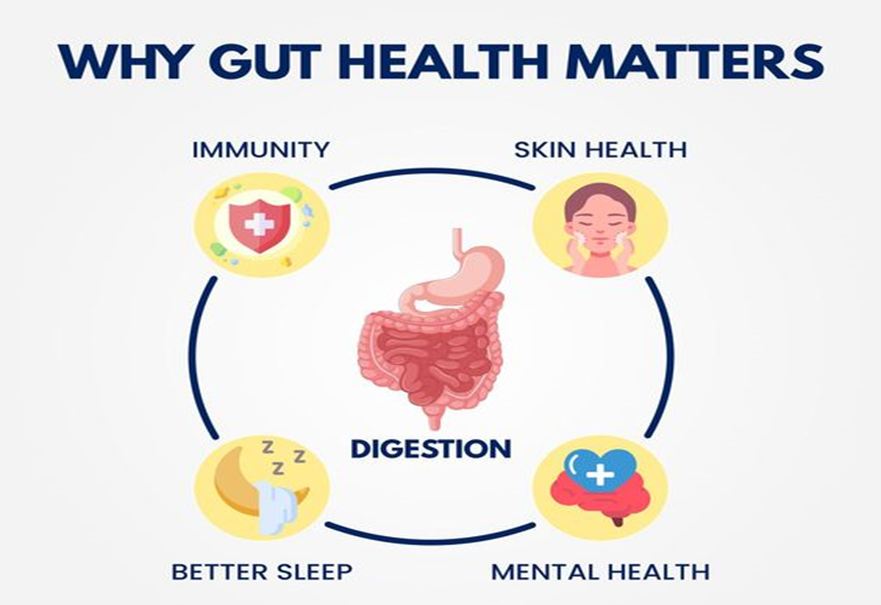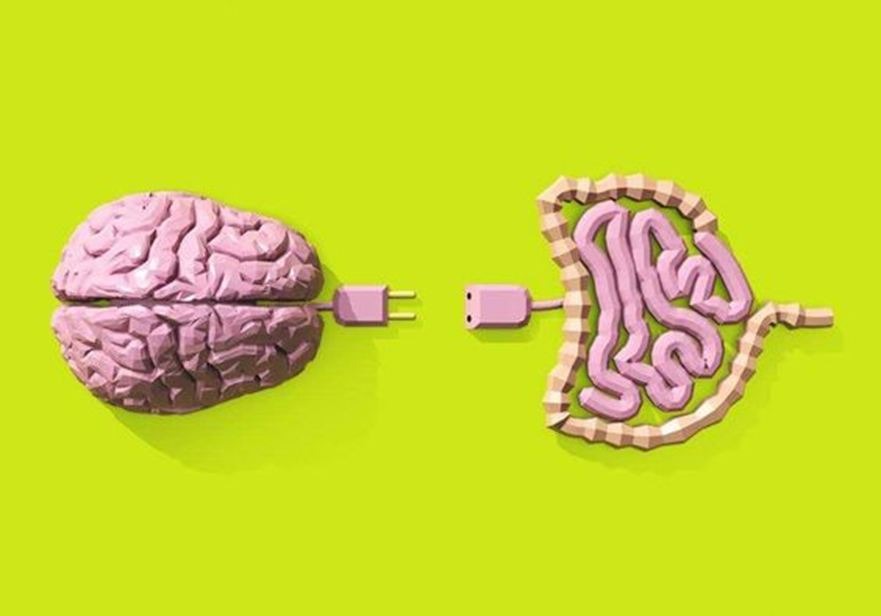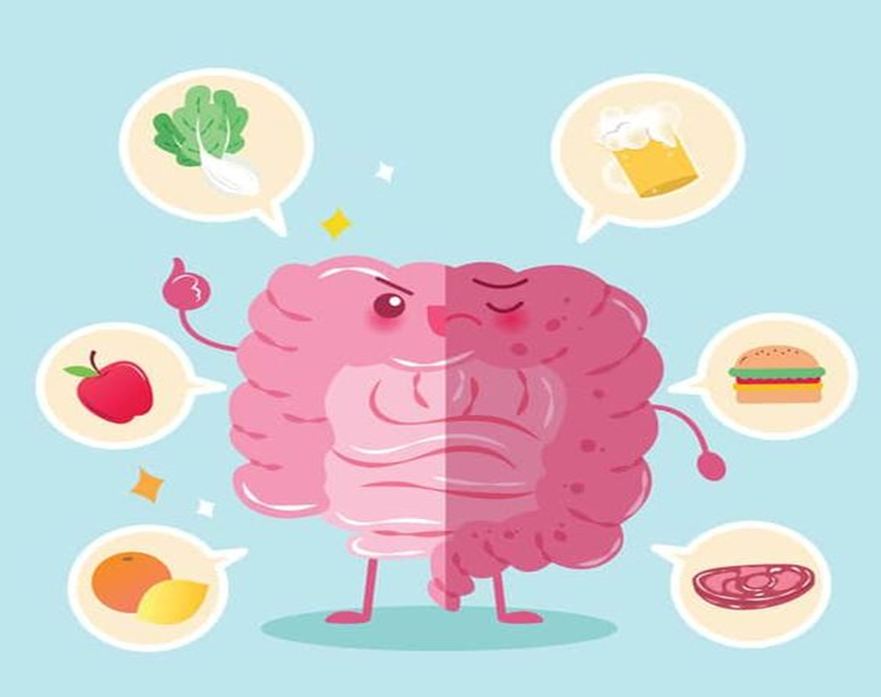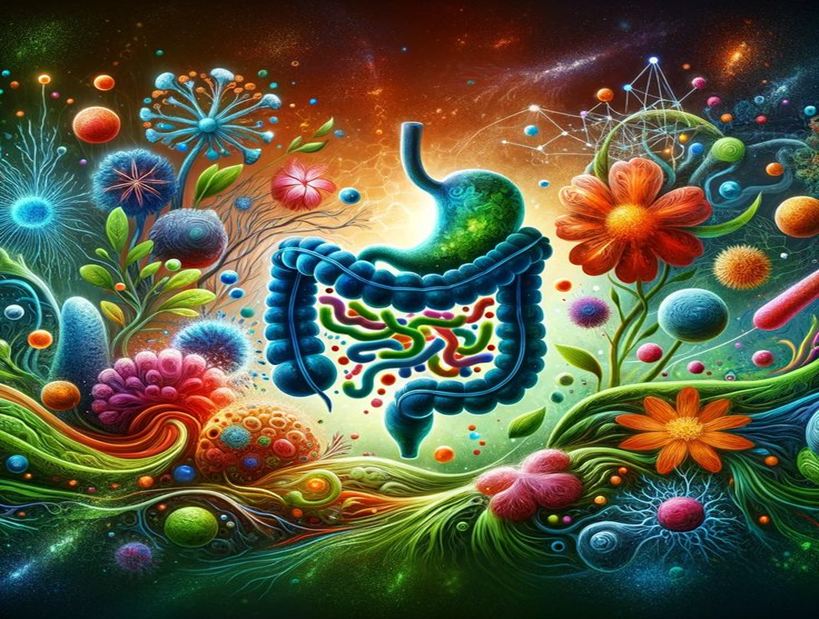Have you ever felt like your stomach has a mind of its own? Gurgling protests, a post-meal rumble, or even a full-blown digestive meltdown – our guts can be noisy. But here’s the surprising truth: those rumbles and butterflies might be a conversation your gut tries to have with you. Giulia Enders, a German writer, scientist, and medical doctor, mentioned in her bestselling “Gut: The Inside Story of Our Body’s Most Underrated Organ” that “A healthy gut is the foundation of a healthy life.” Gut health has become a red-hot topic in recent years, and for good reason!
This complex ecosystem of bacteria, fungi, and other microbes living inside your digestive system is crucial to your digestion and overall well-being. Our gut health turns out to be much bigger than we thought! In the past 20 years, scientists have discovered a strong link between an unhealthy gut and many health problems. This includes things like diabetes, weight gain, joint pain, skin issues, and even feeling down. Basically, taking care of your gut can help you avoid a whole bunch of other problems down the line.
The Microscopic World of Your Gut
Imagine a bustling metropolis teeming with trillions of tiny citizens. This isn’t some futuristic sci-fi movie; it’s a pretty accurate description of what’s happening inside your gut! These citizens are a diverse group, a mix of good and bad bacteria and some helpful fungi and other microbes. The good guys, known as beneficial bacteria, are the heroes of your digestive story. They help break down food, absorb nutrients, and even keep the bad guys in check. The bad guys, well, they can cause trouble. They may contribute to bloating, gas, and even more severe health issues down the line.
The balance between these two forces is key to a healthy gut. When the good guys have the upper hand, your digestive system runs smoothly, and you feel your best. But if the bad guys start to take over, things can get physically and mentally uncomfortable.
Your Gut: The Powerhouse of Your Health

Think of your gut as a giant processing plant for everything you eat. The food you consume affects your body’s chemistry, and when things aren’t running smoothly down there, it can impact your health in surprising ways. Forget just gas and grumbles! Your gut does way more than you think. Everything we eat gets processed there, affecting our whole body. So, it makes sense that a healthy gut can lead to better overall health and well-being. In this blog, we’ll explore five key areas of your health that are secretly connected to your gut health. We’ll also share some simple tips to harness the power of your gut and the trillions of tiny creatures living inside it (don’t worry, they’re the good guys!). These tips can help you address common concerns you might not have realized were linked to your gut health!
5 Surprising Ways Your Gut Can Impact Your Health
Glowing Skin: Your gut health can actually affect your skin! A happy gut can mean clearer, healthier skin.
Mental Well-being: Did you know your gut can affect your mood? Taking care of your gut might help you feel happier and more positive.
Food Fuss: Trouble digesting certain foods? Your gut might be the culprit! We’ll explore how your gut can influence food sensitivities and allergies.
Fighting Fit: A healthy gut can help your immune system fight off germs and keep you feeling your best.
Sweet Dreams: Believe it or not, your gut can even affect how well you sleep! We’ll share some tips to promote a happy gut and restful sleep.
Imagine your gut as a tiny world with two essential parts:
The Gut Bugs: These are trillions of tiny creatures, mostly bacteria, that live inside your gut. They help digest food and keep you healthy, but they are affected by many things, like what you eat, how often you exercise, and even how much stress you have.
The Gut Wall: This is like a shield that protects you from bad things like germs that can make you sick. It can get weaker from things like stress, too much alcohol, and unhealthy food.
The good news is that you can take care of your gut bugs and your gut wall by eating healthy foods! So, get ready to learn how to harness the power of your gut and the tiny bugs inside it!
- Gut Health and Glowing Skin

Ever wonder why your skin sometimes breaks out, gets dull, or feels dry? It might be more than just what products you use on the outside. Your gut health can greatly affect how your skin looks and feels! Think of your skin as a window to your internal health. When your gut is happy and healthy, it shows a clear, radiant glow on your face. But when your gut is out of balance, it can lead to problems like acne, eczema, and psoriasis.
Here’s why:
Gut Bugs Gone Wild: Your gut is home to trillions of tiny creatures, mostly bacteria. When the good bacteria outweigh the bad ones, everything runs smoothly. But if the harmful bacteria take over, they can disrupt your gut’s ability to absorb nutrients, fight off toxins, and keep things balanced. This imbalance can lead to inflammation throughout your body, including your skin.
Leaky Gut Blues: Imagine your gut lining like a strong wall, keeping the good and bad stuff in. But stress, unhealthy food, and some medications can weaken this wall, creating tiny leaks. These leaks allow unwanted things to slip through, triggering an immune response that can cause inflammation in your gut and skin.
How to Heal Your Gut Through Your Skin
The best part? You can take control of your gut health and improve your skin naturally! Here are some tips:
Feed Your Gut Friendly Food: Think yogurt, kombucha, and other fermented foods. These are packed with good bacteria that can help keep your gut microbiome happy.
Don’t Forget the Fiber: Your gut loves healthy whole grains and fruits. Fiber helps keep things moving smoothly and flushes out toxins.
Hydrate Right: Water is your friend! It helps eliminate toxins that can irritate your skin. Remember to sip throughout the day instead of chugging it all down with meals.
- The Gut-Brain Connection

You’ve probably heard the saying “butterflies in your stomach” before a big event. Turns out, there’s more truth to that than you might think! Neuroscientists are increasingly discovering a strong link between our gut and brain, often called the gut-brain axis. The trillions of microbes in your gut actually communicate with your brain through a complex network of nerves and hormones. This two-way conversation means a happy gut can contribute to a happy mood, while an unhappy gut can trigger anxiety, stress, and even depression.
Your Gut’s Happy Place Can Be Your Happy Mood
Your gut health might be more connected to your mental health than you think! For a long time, we saw physical and mental health as separate issues. But research shows they’re linked. While therapy and medication are crucial for some, everyone can benefit from taking care of their gut to boost mood and fight low feelings. Did you know? Your gut doesn’t just break down food; it also helps regulate your emotions! Tiny creatures in your gut, called microbes, make “happy hormones” like serotonin. Serotonin helps with sleep, stress, emotions, and appetite. So, it makes sense that a healthy gut with happy microbes can lead to better mental well-being.
Studies have shown that changes in your gut microbiome can directly affect how much serotonin gets used in your brain and body. This means probiotics (good bacteria for your gut) can potentially improve your mood by making more serotonin available. Food plays a role, too! Poor digestion and a weak gut can lead to deficiencies in essential nutrients like B vitamins, zinc, and magnesium. These nutrients are like building blocks for your happy hormones. In short, the healthier your gut and its microbes are, the more happy brain chemicals you can produce, which keeps you feeling good!
How to Boost Your Mental Health
Multivitamins: Getting all the nutrients your body needs to make happy hormones can be challenging through food alone. A multivitamin can help fill in the gaps.
Probiotics: A balanced gut with various good bacteria is linked to positive effects on your mood chemicals. Consider taking a broad-spectrum probiotic.
Zinc and Vitamin D: Include these essential nutrients in your routine. They’re crucial for both gut health and mental well-being.
- Your Gut Reacts to Different Foods

Have you ever noticed feeling uncomfortable after eating certain foods? It can be confusing to figure out if you’re truly allergic, sensitive, or intolerant. Here’s a breakdown to help you understand the difference:
Sensitivities: These are like a low-grade immune system response. They often happen when your gut lining is weak or leaky. Imagine your gut as a house with a strong wall. When the wall gets weak (leaky gut), things that shouldn’t get through, like food particles, can leak out and trigger your immune system to attack, even if it’s not a real threat. This can lead to symptoms like bloating, headaches, or fatigue.
Allergies: This is a more serious immune system response. When you have a food allergy, your body produces special chemicals called antibodies to fight off the food protein, like a germ. This reaction can cause symptoms like rashes, trouble breathing, or facial swelling.
Intolerances: This doesn’t involve the immune system at all. Your body lacks the tools to break down a particular food component. For example, lactose intolerance means your body doesn’t have enough of an enzyme called lactase to digest lactose, the sugar found in milk. This can lead to gas, cramps, or diarrhea.
The Link Between Gut Health and Food Reactions
As you might guess, a healthy gut plays a big role in how you react to food. Our gut houses a large part of our immune system! When you eat, your immune system checks the food to make sure it’s safe. Think of it like a security guard at a party. The security guard can easily tell the difference between food and a threat if the gut lining is strong. But if the gut lining is leaky, proteins from food can sneak through and confuse the security guard, leading to an attack (inflammation) that causes symptoms.
Leaky Gut- When the Walls Come Down
Imagine your gut lining like a strong wall, keeping everything inside where it belongs. But sometimes, things like stress, unhealthy food, or medications can weaken this wall, creating tiny leaks. These leaks allow food particles, including those proteins, to slip through and reach your immune system, which then goes into overdrive. This can lead to inflammation, including skin problems like eczema or joint pain.
How to Improve Your Gut Health and Reduce Food Reactions
The good news is there are ways to strengthen your gut and potentially reduce your reactions to food:
Strengthen Your Gut Lining: Bone broth or collagen supplements can help rebuild your gut barrier and make it less leaky.
Chew Thoroughly: Digestion starts in the mouth! Chewing your food well breaks it down into smaller pieces, making it easier for your gut to digest properly.
Digestive Enzymes: Taking a digestive enzyme supplement can help add extra enzymes, bile salts, and acids to your digestive system, making it easier to break down food and reduce discomfort.
- Gut Health and Your Immune System

Imagine your immune system as your body’s army, always on patrol against invaders like bacteria, viruses, and germs. Just like an army needs resources to be effective, your immune system works best when not overloaded. Gut Health is Your Body’s First Line of Defense. Here’s the surprising part: 80% of your antibody-producing immune system lives right in your gut! When you eat, your gut immune system checks the food to see if it’s a friend or foe.
The problem is, if your gut is constantly fighting off bad stuff, it takes away resources from dealing with other threats. Think of it as having a small army overwhelmed by a tiny border battle – there’s not enough to defend the whole kingdom! On the other hand, when your gut is healthy, and your food doesn’t cause problems, your immune system can focus on bigger threats anywhere in your body. This shows how gut health and immunity are like two sides of the same coin – taking care of one helps the other!
How to Boost Your Immunity with Gut Health
Limit the “Bad Guys”: Cut back on alcohol, caffeine, sugar, and processed foods. These can damage your gut’s good bacteria and weaken its defenses.
Rest and Recharge: Sleep is essential for healing and digestion. When you get enough sleep, your body can repair and support a healthy gut. Aim for plenty of fluids throughout the day to keep everything moving smoothly.
Fuel Your Defenses: Give your immune system a fighting chance with essential nutrients and herbs. Zinc, vitamins C & D, echinacea, and holy basil are great options. You can get them through food or supplements.
- Gut Health and Your Sleeping Pattern

Ever feel like you can’t sleep well when you’ve eaten something unhealthy? Or maybe you notice you’re more sluggish if you haven’t gotten enough sleep? That’s because your gut health and sleep are closely connected –a two-way street!
Think of sleep as your gut’s “rest and digest” time. This is when your gut microbiome, those trillions of tiny creatures living inside you, are most active. They’re busy breaking down food, absorbing nutrients, and keeping everything running smoothly. But here’s the catch: getting enough sleep is crucial for good gut function, and a healthy gut is essential for restful sleep. It’s a bit of a catch-22!
Your Body Clock and the Gut Microbiome Connection
Imagine your body clock as a conductor of an orchestra. It tells your body when to wake up and wind down. Interestingly, your gut bacteria play a role in keeping this conductor in perfect rhythm. They help regulate the release of two key hormones:
Melatonin (the Sandman): This hormone tells your body it’s time to sleep.
Cortisol (the Energizer Bunny): This hormone gives you a morning boost to get going.
If your gut isn’t healthy and your gut bacteria aren’t in top shape, it can disrupt the production of these hormones. This can lead to trouble sleeping at night and feeling sluggish during the day.
The Serotonin Sleep Connection
Remember how we learned about the gut-mood connection earlier? Well, there’s another twist! The production of serotonin, a brain chemical involved in mood regulation, also depends on the health of your gut bacteria. And guess what? Serotonin is a building block for melatonin, the sleep hormone! This means that by taking care of your gut health through your diet, you might improve your sleep cycle – pretty cool, right?
Magnesium- The Rest and Digest Mineral
Magnesium is another superstar for sleep. It’s involved in over 3,000 reactions in your body, and one of its important jobs is helping your body switch into “rest and digest” mode. It sends signals throughout your body to tell your cells to calm down and prepare for sleep. Magnesium also helps with melatonin production, making your sleep more profound and restorative.
How to Sleep Soundly with a Happy Gut
Here are some tips to improve your gut health and get a better night’s sleep:
Feed Your Gut Friends: Eat various whole foods, including fermented foods like yogurt and kimchi. These are packed with good bacteria that can help keep your gut microbiome happy.
Prebiotics for the Win: Prebiotics are like food for good gut bacteria. You can find them in fruits, vegetables, and whole grains.
Probiotics on the Go: Taking a high-quality probiotic supplement can also be a good way to boost your gut bacteria.
Up Your Magnesium Intake: Consider adding a magnesium supplement or eating magnesium-rich foods like almonds, pumpkin seeds, spinach, and edamame.
Healthy Gut, Better Absorption: When your gut is healthy, it absorbs nutrients more efficiently. This means you’re more likely to get the vitamins and minerals you need for good sleep, like magnesium!
A Final Note
So there you have it! Your gut is more than just a place for food to pass through. It’s a complex ecosystem teeming with trillions of tiny creatures that play a surprisingly significant role in your overall health and well-being. From glowing skin and a happy mood to a strong immune system and restful sleep, a healthy gut can be your secret weapon. Taking care of your gut doesn’t require a complete overhaul of your life. Small changes, like incorporating more fermented foods, getting enough sleep, and managing stress, can make a big difference. By listening to your gut, you can unlock health benefits and feel your best from the inside out.
Ready to take charge of your gut health? Start by exploring the resources mentioned throughout this blog post, and don’t hesitate to talk to your doctor or a registered dietitian for personalized advice. By following these tips and building healthy habits, you can create a happy gut environment that will keep you feeling your best from the inside out. A healthy gut is a happy one, which can lead to a happier, healthier you!

